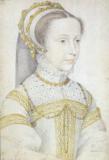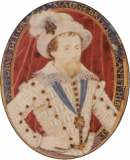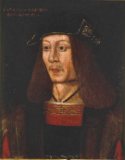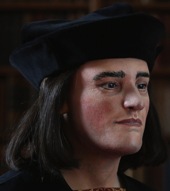 Birth of Mary Stewart, Queen of Scots, at Linlithgow
Birth of Mary Stewart, Queen of Scots, at Linlithgow  Palace. She was the daughter of James V, king of Scots, and Mary of Guise and their only surviving child. Her father died just six days after her birth.
Palace. She was the daughter of James V, king of Scots, and Mary of Guise and their only surviving child. Her father died just six days after her birth.
Mary was executed on 8 February 1587 in the great hall of Fotheringhay.
(Photograph of Linlithgow Palace © Dorothea Preis)
Tags: Scotland
Comments Off on 8 DECEMBER 1542
Posted by: Dorothea Preis in News
 Obviously we are all waiting impatiently for the revelations of the press conference on 4 February 2013, which should tell us whether the human remains found in Leicester are indeed those of King Richard III.
Obviously we are all waiting impatiently for the revelations of the press conference on 4 February 2013, which should tell us whether the human remains found in Leicester are indeed those of King Richard III.
During this time, last Sunday’s (27 Jan 2013) History Cold Case on SBS was of special interest. It dealt with the skeleton of a man found in Stirling Castle in the 1990s. It is thought that the remains are from a man who died in the 14th or 15th century and was buried in a former chapel of the castle. The aim of the project was to find out, who the man might have been, how he died and why he was buried in the castle.
The tests carried out on the ‘Stirling Warrior’ are in many aspects similar to those carried out on the remains found in Leicester, including a reconstruction of the face and body of the knight. When seeing his face, you can imagine coming across a man looking like this with the physique of possibly a rugby player. The facial anthropologists, who made the facial reconstruction of the man in Scotland, Caroline Wilkinson of the University of Dundee, also made the reconstruction of the man found in Leicester.
They also carried out isotope tests, which revealed where the man had grown up. And with the help of original records kept at the National Archives it was even possible to tentatively name him. Of special interest was a barbed arrowhead found with the ‘Stirling Warrior’, as a similar arrowhead was found in Leicester as well.
Though the actual science aspect was possibly somewhat skimmed over in the interest of telling a story and lots of aerial shots of a car driving over a bridge, it is still an interesting insight into what can be done and what we can expect the press conference on 4 February to reveal.
Should you have missed the programme, you can still catch it on SBS On Demand, which is what I did on yesterday’s rained out afternoon. You might also be interested in reading an article on the programme from BBC News.
Tags: Leicester, Richard III, Scotland
Posted by: Dorothea Preis in Quotes

Another opinion from James I/VI – this time on football:
Certainly bodily exercises and games are very commendable, as well for banishing of idleness as for making his body able, but from this compte [list] I debarred all rumling violent exercises as the football. (Basilicon Doron, 1599)
Football in those days was certainly a much more violent affair than the game played according to rules today. It seems the football hooligans could often be found on the field, rather than surrounding it. James was not the only one and by no means the first who held this opinion. Read the rest of this entry »
Tags: Medieval Life, Scotland
Posted by: Win Tonkin in Quotes

We continue our series of the opinions of James VI of Scotland /James I of England.
If only his view had prevailed 400 years ago, when the use of tobacco in Europe was still quite new. In Britain, Sir Walter Raleigh (c. 1552 – 1618) is credited with making tobacco popular.
A custom loathsome to the eye, hateful to the nose, harmful to the brain, dangerous to the lungs, and in the black stinking fume thereof nearest resembling the horrible “Stygian smoke of the pit that is bottomless”. (A Counterblast to Tobacco, 1604)
Tags: Scotland
Posted by: Win Tonkin in Quotes
 At our last general meeting we had the pleasure of listening to Win’s fascinating talk on aspects of Scottish history. She used pictures from the 2003 Historic Scotland Calendar to illustrate her talk. The calendar also contains for each month a quote from James VI of Scotland / James I of England, which we all found very interesting.
At our last general meeting we had the pleasure of listening to Win’s fascinating talk on aspects of Scottish history. She used pictures from the 2003 Historic Scotland Calendar to illustrate her talk. The calendar also contains for each month a quote from James VI of Scotland / James I of England, which we all found very interesting.
James was born on 19 June 1566 at Edinburgh Castle. After his mother Mary Queen of Scots was forced to abdicate in his favour when he was thirteen months old, on 24 July 1567, he became King James VI of Scots. He gained full control of the government in 1581.
In 1603 he succeeded Elizabeth I, who died without issue, as King James I of England. Both countries remained legally separate, but were ruled by the same monarch. Read the rest of this entry »
Tags: Scotland
Posted by: Dorothea Preis in News
 To fit in with our Scottish theme of Win’s fascinating talks, Showtime Premiere is showing on Wednesday, 24 November 2010, at 18h35 the movie “The Stone of Destiny”.
To fit in with our Scottish theme of Win’s fascinating talks, Showtime Premiere is showing on Wednesday, 24 November 2010, at 18h35 the movie “The Stone of Destiny”.
It tells the story of the attempt by four young members of the Scottish Nationalist Party to regain the Stone of Destiny, that icon of Scottish Independence. The film is based on the book by one of the four, Ian Hamilton.
This could not have been timed better. Find out more here.
Tags: Scotland
This is the third part of Win’s talk about Scotland which was presented to our Branch on 9 October 2010.
James III of Scotland reigned 1460-88. He cultivated friendship with England by a marriage being arranged between his son James later IV and Edward IVs 3-year-old daughter the Lady Cecilia. This marriage did not take place as it was cancelled by Edward IV.
 James IV of Scotland
James IV of Scotland
When negotiations broke down skirmishing broke out between the two countries. Read the rest of this entry »
Tags: Edward IV, Henry Tudor, Richard III, Scotland
This is the second part of Win’s interesting talk presented to our Branch on 9 October 2010.
On February 4th, 1818, a group of distinguished men, including the Lord Provost of Edinburgh, Senior Legal Representatives, the Commander in Chief of the Army and Sir Walter Scott, the poet and author, gathered outside the sealed door of the Crown Room in Edinburgh Castle.
Scott’s pleas to the Prince Regent, later George IV, had resulted in a Royal Warrant permitting him and Officers of the State to open the Crown Room. Masonry was removed from the doorway. Inside was a great oak chest.
They approached it apprehensively because there was a strong suspicion that the chest would be empty and that the Honours had been spirited away. Read the rest of this entry »
Tags: Scotland
This is the first part of the fascinating talk Win presented to our Branch on 9 October 2010.
The Stone of Destiny and the Honours of Scotland that is the present Regalia have separate histories as they were never used together in a coronation.
The Stone of Destiny is the block of sandstone on which the ancient Kings of Scotland were crowned at Scone until it was stolen by King Edward I who took it to London where it was housed in Edward the Confessor’s chair until it was returned in 1996 except for a brief period in 1950 when four young Scottish Nationalists repossessed it.
The myth of the origin of the Stone is traced back to Biblical times when it is supposed to have been the pillow on which Jacob rested his head when he dreamed of the angels climbing up their heavenly ladder. It was acquired by Scota, daughter of a Pharaoh of Egypt and brought to Ireland and then to Scotland by Kenneth M’Alpine who became King of the Picts and Scots in 843 AD. Read the rest of this entry »
Tags: Scotland
 On Saturday 9 October 2010, 21 Members and Friends of the NSW Branch of the Richard III Society gathered for our AGM. The interest was high as there was to be a two-part talk given by long-time member Win Tonkin after the business of the day had been concluded. We were pleased to welcome Rosemary back to the group, as well as our Friend from the Dorset, UK, Richard III Society Group, Babs Creamer, who was in Australia to attend her grandson’s 18th birthday party. Read the rest of this entry »
On Saturday 9 October 2010, 21 Members and Friends of the NSW Branch of the Richard III Society gathered for our AGM. The interest was high as there was to be a two-part talk given by long-time member Win Tonkin after the business of the day had been concluded. We were pleased to welcome Rosemary back to the group, as well as our Friend from the Dorset, UK, Richard III Society Group, Babs Creamer, who was in Australia to attend her grandson’s 18th birthday party. Read the rest of this entry »
Tags: NSW Branch, Scotland
 Obviously we are all waiting impatiently for the revelations of the press conference on 4 February 2013, which should tell us whether the human remains found in Leicester are indeed those of King Richard III.
Obviously we are all waiting impatiently for the revelations of the press conference on 4 February 2013, which should tell us whether the human remains found in Leicester are indeed those of King Richard III.





